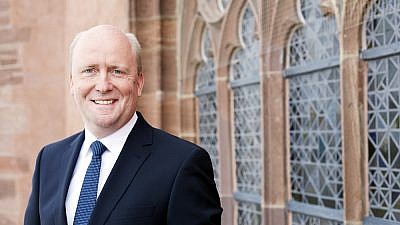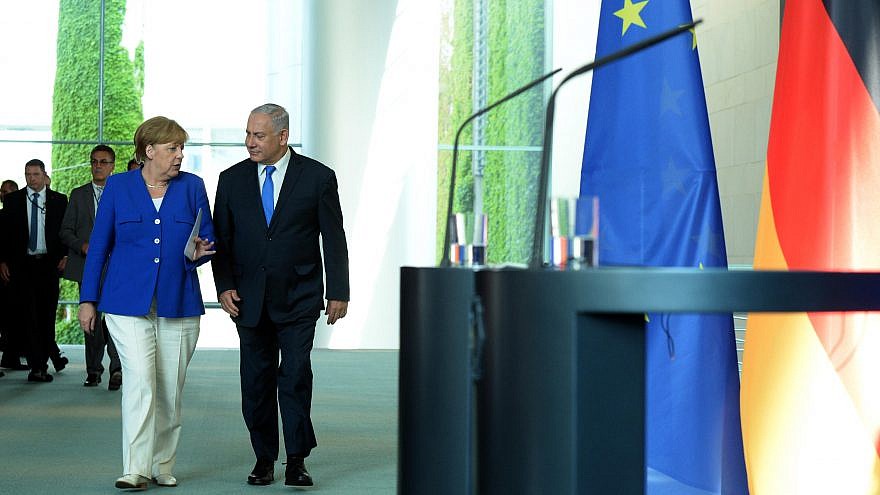Malca Goldstein-Wolf, a German Jew, made headlines last year when she convinced the German broadcasting network Westdeutscher Rundfunk (WDR) to pull its sponsorship of Roger Waters’ German tour. She wrote a heartfelt letter to WDR’s director, Tom Buhrow, pleading with him to shun the former Pink Floyd frontman and vocal leader of the cultural wing of the Boycott, Divestment and Sanctions movement, more commonly known as BDS.
Buhrow responded favorably, and Goldstein-Wolf became a heroine among pro-Israel activists and an object of hate among BDS-supporters, with Waters himself slamming her onstage.
Goldstein-Wolf wishes this were the case. “I think the politicians are aware of the danger of BDS, but they do not act accordingly,” she said in a phone interview. “There is a big difference between words and action.”
Case in point: Recent efforts to exclude the Scottish rappers, Young Fathers, from the Ruhrtrienalle cultural festival in northern Germany have ultimately failed. Young Fathers became known for their anti-Israel views last year when they refused to play for a Berlin festival because Israeli participants were partly sponsored by the Israeli Embassy.
After Ruhrtrienalle booted Young Father’s from the program, citing the trio’s support for BDS, Waters and his cadre of BDS-supporting colleagues, among them Patti Smith and Brian Eno, called on other artists to pull out, piling boycott upon boycott. The festival’s director, Stefanie Carp, subsequently re-invited Young Fathers to perform at her own initiative. The rappers rejected the re-invitation on principle.
“I really can’t believe that it [the festival] is owned by the state government, and that she still has her job,” said Goldstein-Wolf.
Initially, Carp based her disinvite on Germany’s general stance towards BDS, while also stating her personal view that criticism of Israel is not necessarily anti-Semitic in nature. Goldstein-Wolf doesn’t believe that Germany’s remorse over the Holocaust makes the country necessarily more inclined to act forcefully against BDS.
The result of pressure, policy and conference
“The United States is thousands of miles ahead of the Germans,” said Benjamin Weinthal, a BDS-analyst for The Jerusalem Post and a research fellow for the Foundation for Defense of Democracies. “Germany is in a nascent stage.”
Twenty-five U.S. states have issued legislation barring government engagement with BDS-affiliated companies and organizations.
“I think the Americans just recognize it’s fundamentally unfair to boycott Israel,” said Weinthal. “The Americans just get this quickly—both Democrats and Republicans. They also recognize the terrorist connections. The BDS concept—not only boycotts of Israel but forms of delegitimization—has been ubiquitous in Europe across institutions and city governments.”
He cites the 2015 German government’s approval of the European Union labeling of Israeli products from Judea and Samaria (a BDS victory) as evidence of endemic sympathy with movements that delegitimize Israel.

“In Germany, the awareness of what BDS is, [and] when and how it came into being at the scandalous Durban U.N.-conference in 2001, which condemned Israel as a racist and ‘apartheid state,’ is rather minimal,” said Dr. Elvira Grözinger, president of Scholars for Peace in the Middle East in Germany. “Due to well-financed propaganda of the Palestinian Arabs aimed at the total destruction of the Jewish state, it gradually gained the support of anti-Semites in many countries, including Germany, where ‘legitimate Israel criticism’ had become and still is a unique terminus technicus relating to Israel only.”
But some German federal states, cities, institutions and politicians have put word to action—a mixed result of pressure, policy and conscience. Berlin, Munich and Frankfurt have barred BDS-affiliates from receiving municipal funding and space, although only the latter was arguably the result of moral principle. Frankfurt’s mayor, Uwe Becker, is considered one of Germany’s most pro-Israel politicians.
Berlin took its anti-BDS stance last year after the Simon Wiesenthal Center threatened to place its mayor, Michael Müller, on the top 10 list of anti-Semites for his allegedly equivocal stance on BDS-activity in the capital. The annual anti-Israel “Al-Quds [Jerusalem] Day” rally, which has in the past featured flags and supporters of the Lebanese terror group Hezbollah, however, has not been barred from the city. Also in Berlin, the public Jewish Museum recently cancelled an appearance by a BDS-affiliated speaker at the behest of the Israeli Embassy. Likewise, Munich enacted legislation in 2017 to bar BDS from municipal engagement following Jewish community pressure.
Trying to bank on learning from the past
The Cologne-based Bank for Social Economy (Bank für Sozialwirthschaft) has been another BDS flashpoint. The bank holds the account of the major BDS arm in Germany: the Jewish Voice for a Just Peace in the Middle East (JV).
“Members of JV are among the strongest supporters of BDS here,” said Gaby Spronz, the Israeli-born moderator of “Aktionsforum Israel,” a Facebook group consisting of German pro-Israel activists, journalists and politicians.
JV is a de facto sister organization of the far-left American “Jewish Voices for Peace.” Both have defended members of the Popular Front for the Liberation of Palestine, a terrorist organization. JV exploits its Jewish credentials, said Spronz, to gain legitimacy.
A slew of Jewish organizations, as well as Israeli and American lawmakers, has called on the bank to close its BDS-affiliated accounts, which it did in 2016, but only temporarily.
“The bank and JV sat together, and they wrote an agreement saying the JV proclaimed it accepts the existence of Israel. That was enough for the bank,” noted Spronz. “JV, however, denies the existence of Israel as long as there is no Palestinian state and the right of return for Palestinian refugees. Basically, as a result, there will no longer be a Jewish state.”
Complicating matters is the Jewish communities’ own ties with the bank. The Central Jewish Welfare Organization (Zentralwohlfahrtstelle der Juden-ZWST) is a bank shareholder. The publicly funded Berlin Jewish Community (Jüdische Gemeinde Berlin), which did not respond to request for comment, holds an account there. On the other hand, the LGBT organization Magnus Hirschfeld Foundation and Keren HaYesod-United Israel Appeal have both pulled their accounts from the bank in protest. The German-based Jewish National Fund recently announced that it will pull its account if the bank does not discontinue business with BDS groups.
“Both in writing and throughout several personal discussions, ZWST managers have asked the management of the Bank für Sozialwirtschaft to terminate business relations with BDS organizations or no longer permit them in the future, and thus to follow the example of other banks,” said Aron Schuster, director of ZWST.
ZWST is a partner of the publicly funded Central Council of Jewish Communities (Zentralrat) whose director, Joseph Schuster, is Aron’s father. The Zentralrat has similarly stated its dismay with the bank, stating: “We take a critical view of the fact that the bank apparently has business to do with an organization that is close to the BDS movement. In this respect, we support ZWST’s efforts to influence the bank accordingly.”
No deadline or ultimatum has been revealed. Weinthal believes that the official Jewish community’s refusal up until now to divest from the bank is undermining the fight against the BDS.
“How can you expect the non-Jews to fight BDS when the Jews won’t?” emphasized Weinthal.
Goldstein-Wolf’s recently wrote to the bank’s director, Helmet Schmitz. “You may not be aware of how dangerous this anti-Semitic organization is for us,” she wrote. “Otherwise I cannot understand how a German bank with Jewish shareholders does not want to have learned anything from the past. … I am writing to you not only as a top manager, but I’m also trying to reach you as a person.”
So far, she has not heard from Schmitz; neither has JNS. She thinks that success in fighting anti-Semitism in Germany often depends on the moral conscience of the individuals at the helm, as was the case with Buhrow.
“If you have one person that really wants to do something, you’re lucky,” she said. “But you have to find them.”


























JVP & JV are not Jewish groups.